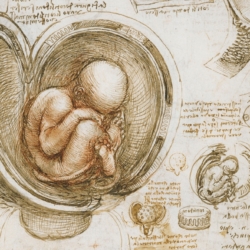| Source (Hebrew) | Translation (English) |
|---|---|
Yetsira is the second world in the Kabbalistic model of the Tu biShvat meal, the one directly above the physical and perceivable world. Fury, serenity, loss, lust…This world is represented by fruits with inedible cores perhaps because emotion is pure — but it is also subjective, subject to whimsy, and far from innocent. | |
The Tu biShvat seder is a metaphor. But usually we use metaphor in our daily lives to accomplish, persuade, inspire or explain. There is something we’re bending metaphor to accomplish. This meditation is an exercise in free-thinking. Here, just play with metaphor for the sake of expressing and exploring your emotional state, history, anticipations and apprehensions. | |
Each of the quotations from the Torah or rabbinical writings below represents an emotion. After we say the blessing over the olives, read the quotations, pick one (or more) that resonate, and play with the metaphor to reach a deeper understanding of yourself and others. | |
בָּרוּךְ אַתָּה יְיָ אֱלֹהֵינוּ מֶלֶךְ הָעוֹלָם, בּוֹרֵא פְרִי הָעֵץ: |
Say the blessing over the olives, Blessed are You, YHVH Eloheinu, cosmic majesty, for creating the fruit of the tree and eat a few. Then wait for whoever feels the first connection to a quotation. When everyone has had a chance to relate, say the blessing over the second cup of wine (all white with one drop of red), and move on to Beriah. |
ח הָל֤וֹךְ הָֽלְכוּ֙ הָעֵצִ֔ים לִמְשֹׁ֥חַ עֲלֵיהֶ֖ם מֶ֑לֶךְ וַיֹּאמְר֥וּ לַזַּ֖יִת מלוכה מָלְכָ֥ה עָלֵֽינוּ׃ ט וַיֹּ֤אמֶר לָהֶם֙ הַזַּ֔יִת הֶחֳדַ֙לְתִּי֙ אֶת־דִּשְׁנִ֔י אֲשֶׁר־בִּ֛י יְכַבְּד֥וּ אֱלֹהִ֖ים וַאֲנָשִׁ֑ים וְהָ֣לַכְתִּ֔י לָנ֖וּעַ עַל־הָעֵצִֽים׃ |
Judges 9:8-9 One day the trees went out to anoint a king for themselves. They said to the olive tree, ‘Be our king.’But the olive tree answered, ‘Should I give up my oil, by which both gods and humans are honored, to hold sway over the trees?’ |
יג וָאֶתֵּ֨ן לָכֶ֜ם אֶ֣רֶץ ׀ אֲשֶׁ֧ר לֹֽא־יָגַ֣עְתָּ בָּ֗הּ וְעָרִים֙ אֲשֶׁ֣ר לֹא־בְנִיתֶ֔ם וַתֵּשְׁב֖וּ בָּהֶ֑ם כְּרָמִ֤ים וְזֵיתִים֙ אֲשֶׁ֣ר לֹֽא־נְטַעְתֶּ֔ם אַתֶּ֖ם אֹכְלִֽים׃ |
Joshua 24:13 So I gave you a land on which you did not toil and cities you did not build; and you live in them and eat from vineyards and olive groves that you did not plant. |
כ כִּ֤י תַחְבֹּט֙ זֵֽיתְךָ֔ לֹ֥א תְפָאֵ֖ר אַחֲרֶ֑יךָ לַגֵּ֛ר לַיָּת֥וֹם וְלָאַלְמָנָ֖ה יִהְיֶֽה׃ |
Deuteronomy 24:20 When you beat the olives from your trees, do not go over the branches a second time. Leave what remains for the foreigner, the fatherless and the widow. |
י וַאֲנִ֤י ׀ כְּזַ֣יִת רַ֭עֲנָן בְּבֵ֣ית אֱלֹהִ֑ים בָּטַ֥חְתִּי בְחֶֽסֶד־אֱ֝לֹהִ֗ים עוֹלָ֥ם וָעֶֽד׃ |
Psalm 52:10 But I am like an olive tree flourishing in the house of God; I trust in God’s unfailing love for ever and ever. |
אמר ר’ אלעזר לעולם יסדר אדם שלחנו בערב שבת אף על פי שאינו צריך אלא לכזית ואמר ר’ חנינא לעולם יסדר אדם שלחנו במוצאי שבת אף על פי שאינו צריך אלא לוגמא |
Talmud Bavli Shabbat 119b R. Elazar said: One should always set a full table on the eve of the Shabbat, even if one requires for himself no more food than the bulk of on olive. R. Hanina said: One should always set a full table at the departure of the Shabbat, even if one requires for himself no more food than the bulk of on olive. |
וַיֹּאמֶר אֵלֶיהָ אֱלִישָׁע מָה אֶעֱשֶׂה לָּךְ הַגִּידִי לִי מַה יֶּשׁ לכי [לָךְ] בַּבָּיִת וַתֹּאמֶר אֵין לְשִׁפְחָתְךָ כֹל בַּבַּיִת כִּי אִם אָסוּךְ שָׁמֶן. |
2 Kings 4:2 Elisha replied to her, “How can I help you? Tell me, what do you have in your house?” “Your servant has nothing there at all,” she said, “except a small jar of olive oil.” |
זַיִת רַעֲנָן יְפֵה פְרִי תֹאַר קָרָא יְהוָה שְׁמֵךְ לְקוֹל הֲמוּלָּה גְדֹלָה הִצִּית אֵשׁ עָלֶיהָ וְרָעוּ דָּלִיּוֹתָיו. |
Jeremiah 11:16 YHVH called you a thriving olive tree with fruit beautiful in form. |
כַּאֲשֶׁר הָיִיתִי בִּימֵי חָרְפִּי בְּסוֹד אֱלוֹהַּ עֲלֵי אָהֳלִי. בְּעוֹד שַׁדַּי עִמָּדִי סְבִיבוֹתַי נְעָרָי. בִּרְחֹץ הֲלִיכַי בְּחֵמָה וְצוּר יָצוּק עִמָּדִי פַּלְגֵי שָׁמֶן. בְּצֵאתִי שַׁעַר עֲלֵי קָרֶת בָּרְחוֹב אָכִין מוֹשָׁבִי. |
Job 29:4-6 Oh, for the days when I was in my prime, when God’s intimate friendship blessed my house, when the Almighty was still with me and my children were around me, when my path was drenched with cream and the rock poured out for me streams of olive oil. |
ואמר רב זוטרא בר טוביה אמר רב: עתידים בחורי ישראל שיתנו ריח טוב כלבנון שנאמר (הושע יד ז) ילכו יונקותיו ויהי כזית הודו וריח לו כלבנון. |
Talmud Bavli Berachot 43b R. Zutra bar Tobiah said in the name of Rav: Young men in Israel who have not savored the taste of sin are destined to give forth sweet fragrance like that of Lebanon, as is said, “His young men shall spread out far, and his beauty shall be as the olive tree, and his fragrance as Lebanon” (Hos 14:7). |
יַחְמֹס כַּגֶּפֶן בִּסְרוֹ וְיַשְׁלֵךְ כַּזַּיִת נִצָּתוֹ. לד כִּי עֲדַת חָנֵף גַּלְמוּד וְאֵשׁ אָכְלָה אָהֳלֵי שֹׁחַד. |
Job 15:33 He will be like a vine stripped of its unripe grapes, like an olive tree shedding its blossoms. |
בֵּין שׁוּרֹתָם יַצְהִירוּ יְקָבִים דָּרְכוּ וַיִּצְמָאוּ. |
Job 24:11 They crush olives among the terraces; they tread the winepresses, yet suffer thirst. |
אִישׁ מַחְסוֹר – אֹהֵב שִׂמְחָה, אֹהֵב יַיִן וָשֶׁמֶן – לֹא יַעֲשִׁיר. |
Proverbs 21:17 Whoever loves wine and olive oil will never be rich. |
הִכֵּיתִי אֶתְכֶם בַּשִּׁדָּפוֹן וּבַיֵּרָקוֹן הַרְבּוֹת גַּנּוֹתֵיכֶם וְכַרְמֵיכֶם וּתְאֵנֵיכֶם וְזֵיתֵיכֶם יֹאכַל הַגָּזָם וְלֹא שַׁבְתֶּם עָדַי נְאֻם יְהוָה. |
Amos 4:9 “Many times I struck your gardens and vineyards, destroying them with blight and mildew. Locusts devoured your fig and olive trees, yet you have not returned to me,” declares YHVH. |
אוֹצָר נֶחְמָד וָשֶׁמֶן בִּנְוֵה חָכָם, וּכְסִיל אָדָם יְבַלְּעֶנּוּ. |
Proverbs 21:20 The wise store up choice food and olive oil, but fools gulp theirs down. |
ת”ר חמשה דברים משכחים את הלימוד האוכל ממה שאוכל עכבר וממה שאוכל חתול והאוכל לב של בהמה והרגיל בזיתים והשותה מים של שיורי רחיצה והרוחץ רגליו זו על גבי זו ויש אומרים אף המניח כליו תחת מראשותיו חמשה דברים משיבים את הלימוד פת פחמין וכל שכן פחמין עצמן והאוכל ביצה מגולגלת בלא מלח והרגיל בשמן זית והרגיל ביין ובשמים והשותה מים של שיורי עיסה ויש אומרים אף הטובל אצבעו במלח ואוכל הרגיל בשמן זית מסייע ליה לרבי יוחנן דאמר רבי יוחנן כשם שהזית משכח לימוד של שבעים שנה כך שמן זית משיב לימוד של שבעים שנה: |
Talmud Bavli Horaioth 13b Our Rabbis taught: Five things make one forget one’s studies: Eating something from which a mouse or a cat has eaten, eating the heart of a beast, frequent consumption of olives, drinking the remains of water that was used for washing, and washing one’s feet one above the other. Others say: He also who puts his clothes under his head [forgets his studies]. Five things restore one’s learning: Wheaten bread and much more so wheat itself, eating a roasted egg without salt, frequent consumption of olive oil, frequent indulgence in wine and spices, and the drinking of water that has remained from kneading. Others say: Dipping one’s finger in salt and eating is also included. ‘Frequent consumption of olive-oil’. This corroborates the view of R. Johanan who said: As the olive causes one to forget seventy years of study, so does olive oil restore seventy years of study.[1] Ben Murane originally summed up this passage: “Five things make a man forget his learning: …[including] frequent consumption of olives…But five things improve a man’s learning: …[including] frequent consumption of olive oil…” [–Aharon Varady] |
“Tu biShvat seder meditation on Yetzira” was first posted at Ben Murane’s blog, Judaism Without Borders. We are grateful for his having shared his meditation and selection of verses with translation with a Creative Commons By Attribution-ShareAlike (CC-BY-SA, 3.0 Unported) license. Ben Murane writes,
This exercise was inspired by an activity called “Star Cafe” led by Rabbi Yoni Gordis of the Center for Leadership Initiatives when I was a 2008 Kivun Fellow. Rabbi Yoni taught us to value the power of metaphor, which I consider one of my key takeaways from the fellowship. Oh, and “managing up.”My thanks to Rebez and Rabbi Shugs for inviting my participation and encouraging me to share the results.
Notes
| 1 | Ben Murane originally summed up this passage: “Five things make a man forget his learning: …[including] frequent consumption of olives…But five things improve a man’s learning: …[including] frequent consumption of olive oil…” [–Aharon Varady] |
|---|

“Meditation on the World of Yetsirah for the Tu biShvat Seder, by Ben Murane” is shared through the Open Siddur Project with a Creative Commons Attribution-ShareAlike 4.0 International copyleft license.










Leave a Reply